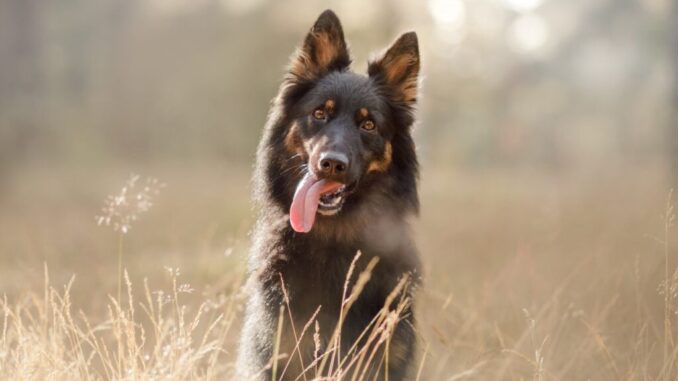
As dogs get older, their needs change significantly. It’s essential to recognise the signs of ageing and adjust their care accordingly. Older dogs often require more frequent veterinary visits. These check-ups can catch early signs of health issues, allowing for timely intervention.
Diet also plays a crucial role. Ageing dogs might need a different balance of nutrients to maintain their health. Opt for high-quality dog food formulated for senior dogs. This ensures they receive the right vitamins and minerals to support their changing bodies. Regular exercise remains important, but the intensity and duration may need adjusting to suit their comfort and ability.
Creating a Comfortable Living Environment
An ageing dog benefits greatly from a comfortable living environment. Consider investing in a supportive dog bed that eases joint pain and provides ample cushioning. The dog bed collections at House Monty offer a range of options designed specifically for older dogs, ensuring they have a restful place to sleep.
Temperature control is another aspect to consider. Older dogs can be more sensitive to extreme temperatures. Ensure their sleeping area is kept at a comfortable temperature, not too hot or too cold. Also, ensure easy access to their favourite spots by providing ramps or steps if needed.
Monitoring Health and Mobility
Health and mobility issues become more common as dogs age. Regular monitoring can help you detect problems early. Arthritis and other joint issues are prevalent in older dogs. Look for signs such as limping, stiffness, or reluctance to move. If you notice these, consult your vet for appropriate treatments which might include medications or supplements.
Weight management is equally important. Excess weight can exacerbate health issues and reduce mobility. Maintain a balanced diet and regular, gentle exercise to keep your dog at a healthy weight. Hydrotherapy and gentle walks are excellent ways to keep them active without putting too much strain on their joints.
Providing Mental Stimulation
Mental stimulation is vital for an ageing dog’s well-being. Engaging your dog in activities that challenge their mind can help keep them sharp and happy. Interactive toys and puzzles are great for this. They provide a fun way for your dog to use their brain and stay engaged.
Training sessions can also be beneficial. Even if your dog is well-trained, reinforcing basic commands or teaching new tricks can keep their mind active. This mental exercise is as important as physical activity in maintaining your dog’s overall health.
Ensuring Proper Nutrition and Hydration
As dogs age, their dietary needs can change significantly. Providing the right nutrition is crucial for maintaining their health. Senior dogs often benefit from diets that are lower in calories but higher in fibre and essential nutrients. Specially formulated senior dog foods are designed to meet these needs, supporting healthy digestion and maintaining optimal body weight.
Hydration is equally important. Older dogs may not drink as much water as they should, leading to dehydration. Ensure that fresh water is always available and encourage your dog to drink regularly. Wet dog food can also help increase their fluid intake, which is particularly useful if your dog tends to drink less.
Regular Veterinary Care
Frequent veterinary visits are essential for older dogs. Regular check-ups allow for early detection of potential health issues. Your vet can monitor your dog’s weight, dental health, and organ function, ensuring that any problems are addressed promptly.
Vaccinations and parasite prevention remain important throughout your dog’s life. Older dogs may have weakened immune systems, making them more susceptible to infections and parasites. Your vet can recommend the best preventive measures to keep your dog healthy.
Adjusting Exercise Routines
While exercise remains important for senior dogs, it needs to be adjusted to match their capabilities. Gentle, low-impact activities are best. Regular walks are beneficial, but the distance and pace should be suited to your dog’s comfort level.
Swimming is an excellent form of exercise for older dogs. It provides a full-body workout without putting stress on their joints. If swimming isn’t an option, consider other forms of gentle exercise like light play sessions or short, frequent walks. Always monitor your dog for signs of fatigue or discomfort and adjust their activity accordingly.
Providing Emotional Support
As dogs age, they may require more emotional support. Senior dogs can experience anxiety and confusion, particularly if they develop conditions like canine cognitive dysfunction. Providing a stable, calm environment can help alleviate these issues.
Spend quality time with your dog, offering plenty of affection and reassurance. Maintaining a consistent routine can also provide a sense of security. If your dog seems particularly anxious or confused, consult your vet for advice on managing these behaviours. Sometimes, medication or behavioural therapy can help improve their quality of life.
Monitoring Behavioural Changes
Older dogs often undergo behavioural changes, which can indicate underlying health issues. It’s crucial to monitor any changes in your dog’s behaviour closely. Signs such as increased aggression, excessive barking, or changes in sleeping patterns can be symptoms of pain, cognitive decline, or other health problems.
If you notice any significant behavioural changes, consult your vet for a thorough examination. They can help determine the cause and suggest appropriate treatments or lifestyle adjustments. Understanding and addressing these changes promptly can significantly improve your dog’s quality of life.
